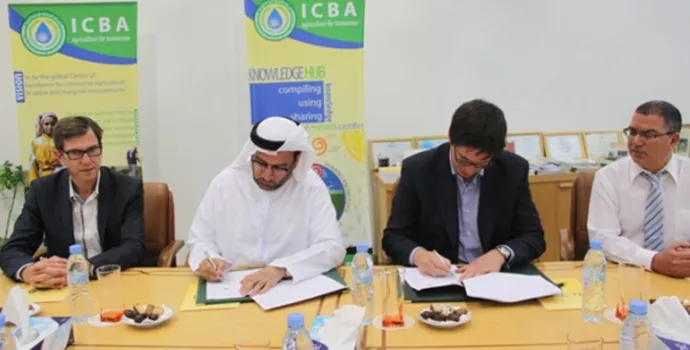International Center for Agriculture (ICBA) Undertakes a Study on the Reuse of Biosolids in the Emirate of Ajman
Dubai - International Center for Agriculture (ICBA) and Ajman Sewerage have signed an agreement to implement a feasibility study on the reuse of biosolids produced at Ajman Wastewater Treatment Plant on Wednesday, 28 August 2013. Dr. Ahmed Al Sharif, Deputy Director General of ICBA, and Mr. Peter Lembrechts, General Manager of Ajman Sewerage, signed the agreement, which sets the expected delivery date of the final report of this study on the 31 January 2014.
Dr. Ahmed Al Sharif praised the objectives of this study, which seeks to determine the market for practical reuse of biosolids in Ajman in the near term and the related procedures. This study will learn about the status of sewage sludge in Ajman and its capacity to be reused as biosolids. It will determine the appropriate markets for the use of biosolids and the restrictions relating to quality, quantity, and the need for more laws and legislative policies. In addition, this study will identify the obligations of producer and users. Implementing the results of the study will be highlighted in a roadmap plan, which will be part of the outcome.
Dr. Al Sharif added, “This agreement will support the partnerships between the center and the private sector. This project supports the vision of the UAE in general and the Emirate of Ajman in particular in reducing waste and achieving sustainability; where, the overall strategy of the UAE seeks to achieve a zero waste environment and to dispose of the need for landfills.
ICBA’s team for this project consists of Dr. Abdullah Shankiti (Senior Soil Management Scientist), Dr. Khalil Ahmed Ammar (Water Resources Management Scientist), Dr. Nurul Akhand (Irrigation Management Scientist), and Dr. Berhanu Degefa (Socio - Economic Scientist). This team amasses extensive experience in the field of water, land, irrigation, the reuse of treated wastewater, and the economic and social implications of such project. The center has already conducted a number of studies that have had a direct impact on the development of policies concerning water, agriculture, and the reuse of sewage water in many countries.
Mr. Peter Lembrechts stated that Ajman Sewerage highly appreciates everything that has to do with reuse whether for treated effluent or for biosolids. Reuse represents a very important element in achieving sustainable development. He also pointed out that collaborating with ICBA on the reuse of biosolids came as a natural step, since ICBA has an extensive experience in this field.
Ajman Sewerage was established by H.H. Sheikh Humaid bin Rashid Al Nuaimi, Ruler of Ajman in 2002. Ajman Sewerage is the perfect example of a successful partnership between the Government of Ajman and two leading international experts from the private sector, Besix and Veolia. Ajman Sewerage is chaired by H.H. Sheikh Rashid bin Humaid al Nuaimi. Under his leadership and with the knowhow and expertise of its private partners Besix and Veolia, Ajman Sewerage has financed and implemented a wastewater collection network with a wastewater treatment plant to treat all the wastewater from Ajman Emirate and to deliver treated effluent to the City of Ajman. Ajman Sewerage is striving continuously to provide the highest standard of professional and customers services that ensure a healthy and comfortable standard of living for the people of Ajman.
The International Center for Biosaline Agriculture (ICBA) work addresses the closely linked challenges of water, environment, income, and food security. The Center’s applied research for development aims to address the agricultural challenges in marginal environments including assessment of natural resources, climate change adaptation, crop productivity and diversification, aquaculture and bio-energy and policy analysis. ICBA is working on a number of technology developments including the use of conventional and non-conventional water (such as saline, treated wastewater, industrial water and seawater); water and land management technologies and remote sensing and modeling for climate change adaptation. Building capacity and sharing knowledge is an important part of all ICBA does. ICBA’s work reaches countries, including least developed countries, in Central Asia and the Caucasus, the Middle East and North Africa (MENA), South and South East Asia, sub Saharan Africa and Gulf Cooperation Council countries.
